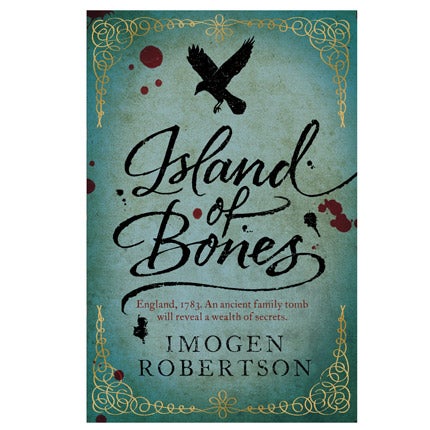Island of Bones, By Imogen Robertson
Lakes tale plunges to dark depths

When she is not penning her insidiously diverting historical crime novels, Imogen Robertson spends her time playing the cello music of Bach and Shostakovich – proof of her civilised nature.
But what makes such books as Island of Bones so unusual is their audacious mix of a cultural gloss and uncomplicated, straight-ahead storytelling. The multi-layered nuance of Peter Ackroyd and the buttonholing narrative grasp of Stephen King are stirred into the mix.
Although such a combination shouldn't really work, Robertson makes the various elements coalesce to striking effect. Her latest novel has all the panache of its predecessors, Instruments of Darkness and Anatomy of Murder, with a particularly strong evocation of the Lake District. Of course, the Lakes in the 18th century was different from the region we know today.
Island of Bones features Robertson's ill-matched protagonists, Harriet Westerman and Gabriel Crowther. The former is a strong-willed Sussex landowner; Crowther is a severe anatomist who prefers his own company – but is prepared to help Harriet in her mystery-solving activities.
The tomb of a nobleman, the First Earl of Greta, appears to have lain untouched (on the eponymous island) for hundreds of years, but when its stone lid is pried loose there is one body too many inside. Crowther's family now owns the land that belonged to the Earl, and Crowther sports a family history quite as chequered (and sanguinary). Crowther's brother, in fact, was executed for the murder of their father, the Baron of Keswick. Crowther and Westerman are soon in dark territory. Their journey into a mysterious ancient town – in search of the identity of the second skeleton – has its share of unsettling encounters, not with the supernatural "boggles" said to walk the streets, but a more corporeal menace. There is a personal significance for Crowther in their discoveries.
A particular inspiration for Robertson has been the poet Thomas Gray who, for her, evoked the sinister beauty of the landscape in the 18th century – as well as virtually single-handedly creating the tourist industry. Both notions are creatively utilised in this splendid mystery. What's more, Robertson is to be commended for not having her Lake District-travelling characters encounter William Wordsworth, wandering lonely as a cloud.
Join our commenting forum
Join thought-provoking conversations, follow other Independent readers and see their replies
Comments